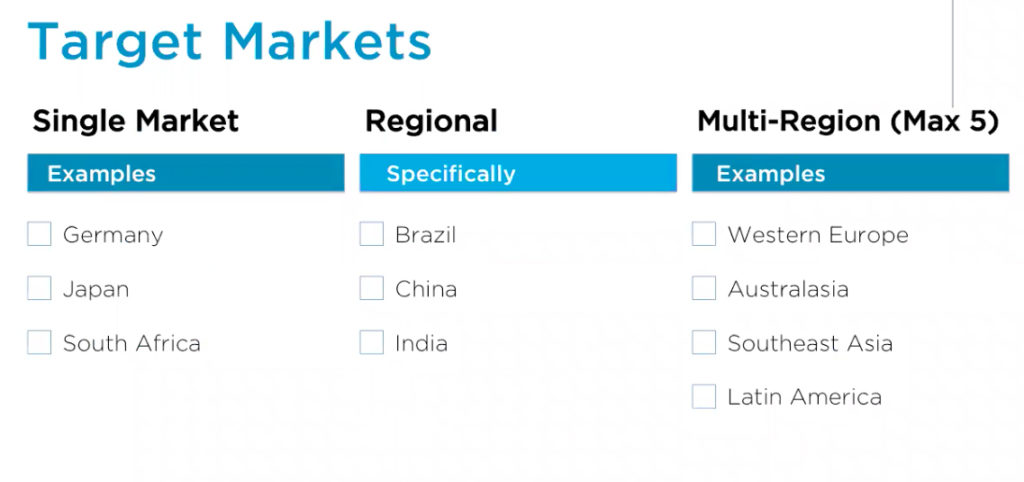2019 CanExport FAQs: Canadian Business Expansion Grant
2019 CanExport FAQs: Canadian Business Expansion Grant

Do you want to enter a new market outside of Canada?
You’re in luck! On August 22, 2019, the CanExport business expansion grant increased eligible expenses to cover 75% to a maximum amount of $75,000 for small to medium-sized enterprises (SMEs). The program will be expanded to include companies from Canada’s agriculture, agri-food and agri-products industry which includes fish and seafood. An SME is defined as a company with under 500 employees.
We often mention in previous blog posts the importance of understanding the grant intention in the application process. The goal of the CanExport Canadian business grant is to help companies develop new export opportunities and markets, especially high-growth emerging markets.
We work with clients to clearly demonstrate how their market expansion projects help with the grant’s goal of building the presence of Canadian goods and services in foreign markets. We have a 92% success rate for getting our clients market expansion grants.
Note: The details of this grant can change anytime and the information in this article is accurate until the date the post has been published.
Who is eligible for the CanExport business expansion grant?
- An SME with a minimum of $100,000 in revenues to a maximum of $100 million
- Under $20,000 in sales in the last two years (2017 and 2018) in each of the target markets or less than 10% in total international sales across all of the targeted markets in the last two years
Let’s say you want to ship products in the UK, a new market for your business. Currently, the UK represents less than 10% of all of your international sales or under $20,000 in sales in the last two years. No sales means that you didn’t get a purchase order or a contract outside of Canada. In this case, you would be eligible to apply for the CanExport government business grant.
CanExport can cover multi-year projects and a great option if you are looking for government funding for trade shows. For example, if you identified four trade shows over 18 months in the US market, CanExport can cover the eligible expenses in this time period like preparing a booth and certain travel expenses.
2019 CanExport market expansion grant changes
These are some of the updates with the CanExport:
- Before, SMEs needed to earn at least $200,000 in revenue, but now it is $100,000. This makes the business expansion grant more competitive because more companies can apply to receive the funding. That’s why it’s important for clients to work with us to get an application done as quickly as possible.
- CanExport used to pay for 50% of the market expansion project up to $50,000. But now the Canadian business grant limit has increased to $75,000.
- Before, agrifoods used to get funding through the Canadian Agricultural Partnership programs, but now they have moved all of that to CanExport.
- There used to be a limitation on consulting fees but now they have relaxed the capped amount.
What expenses does the CanExport business expansion grant cover?
These are some of the common expenses that CanExport covers to provide more government support for small business:
- Travel expenses
Travel expenses are limited to two people per organization per event. For example, if your application is approved, the business expansion grant can cover a sales manager and marketing manager going to one event in the UK as well as another two people going to a different event in the UK.
- Tradeshow and conferences
The grant covers not just attending the event but the cost of setting up your exhibit as well.
- Interpretation and translation services
If you go to a country like Japan where English is not the primary language and you need translation for marketing materials during meetings, CanExport can cover the cost of the translation.
- Marketing tools
The Canadian business grant can pay for print materials like brochures and sales kits. If you have a website and need a dedicated page targeting the new market, CanExport may be able to cover the cost of that part of the website. But it won’t pay for the cost of running your whole website.
- Advisory or consulting consulting
Because having an advisor who understands how to sell to a marketplace, the legal details and accounting requirements is very valuable to your market expansion projects, CanExport can pay for these services.
Also, marketing, public relationships and lead generation services can be covered under the grant. Understand that only additional market research in a particular niche would be covered. You must already have enough research and justification to go into the market to be approved for the grant.
- IP protection and contracts
Unfortunately, many business owners often don’t think enough about IP protection when they go to the US, Singapore or other countries. CanExport can pay for parts of the IP protection application fees for a particular country or legal documents for distribution contracts. Doing this due diligence will help set you up for success in the new market.
The program will either be through a grant or contribution. The difference is with grant funding, a company can receive some of the money upfront from the program. This option is usually for smaller companies with under 15 employees because it could be harder for them to come up with the money up front and make a claim later on.
With a contribution method of funding, the company has to ensure they have specific things they want to do and the funders will check the project throughout the process. They may ask for interim reports at certain phases and at the end of the project.
What expenses does CanExport business expansion grant not cover?

We often explain to clients what CanExport won’t pay for when we do the application. Here are some of the items that the business expansion grant doesn’t cover:
- Expenses that were paid before the government grant approval was received or outside the project proposal dates
For example, if you put a deposit for a trade show booth of an event in October this year before you got approved for the CanExport business expansion grant, you can’t put that in your project application. How to get around that is you can take back your deposit and begin the process immediately.
- Sourcing or development activities
If you want to go to another country like Vietnam or China to find suppliers, CanExport won’t cover this grant. But there is a separate program called CanExport Innovation to support R&D if a company wants to go overseas to see if it is possible to set up a collaborative partnership to develop a new product or service.
- Setting up an office
The grant doesn’t pay for setting up an office in a new location.
- Domestic or foreign staff costs
If someone in your company is doing international sales, the salaries won’t be covered. The cost of someone selling will be covered if the person is on contract specifically for overseas sales.
- Business plans and marketing plans to support the application
A company already has to have the necessary documents, research and verification to justify into a new market. CanExport does not cover the market research and business plan phase to explore the viability of the new market.
- Overhead
CanExport does not cover operational expenses like equipment, warehousing and rent.
Market definitions

We work with clients to verify their target markets before starting the application. For CanExport, some markets are categorized by entire countries like Germany, Japan or South Africa. But for places like Brazil, China and India, these countries are split in high growth market segments. What this means for the Canadian business grant is if you are already shipping to Shanghai, China and doing a million in sales but have no activity in Beijing, you can qualify for funding to move into the Beijing market.
It’s important to know that you can only have one CanExport project running at a time. So if you have a multi-year project happening in Brazil, you can’t apply for funding in Japan the following year. You have to complete one market before you go to another.
Conclusion
The CanExport business expansion grant increased their funding limit to 75% for up to $75,000 for SMEs on August 22, 2019. To be eligible, a company has to have between $100,000 to $100 million in annual revenue, less than $20,000 in total international sales in the last two years in the target market or less than 10% of international sales in the last two years.
Some of the eligible expenses that the CanExport market expansion grant covers include travel expenses, the cost of setting up a booth, consulting services, translation services, producing marketing materials and a part of IP protection fees. The program does not cover certain expenses such as setting up a new office internationally, sourcing activities, staff costs, business plans and overhead.
Our team has a 92% success rate of securing business expansion grants. We ensure that clients have everything they need to put a complete application together as well as the capacity to carry out projects. Get in touch with us today to see what grants your business qualifies for.


